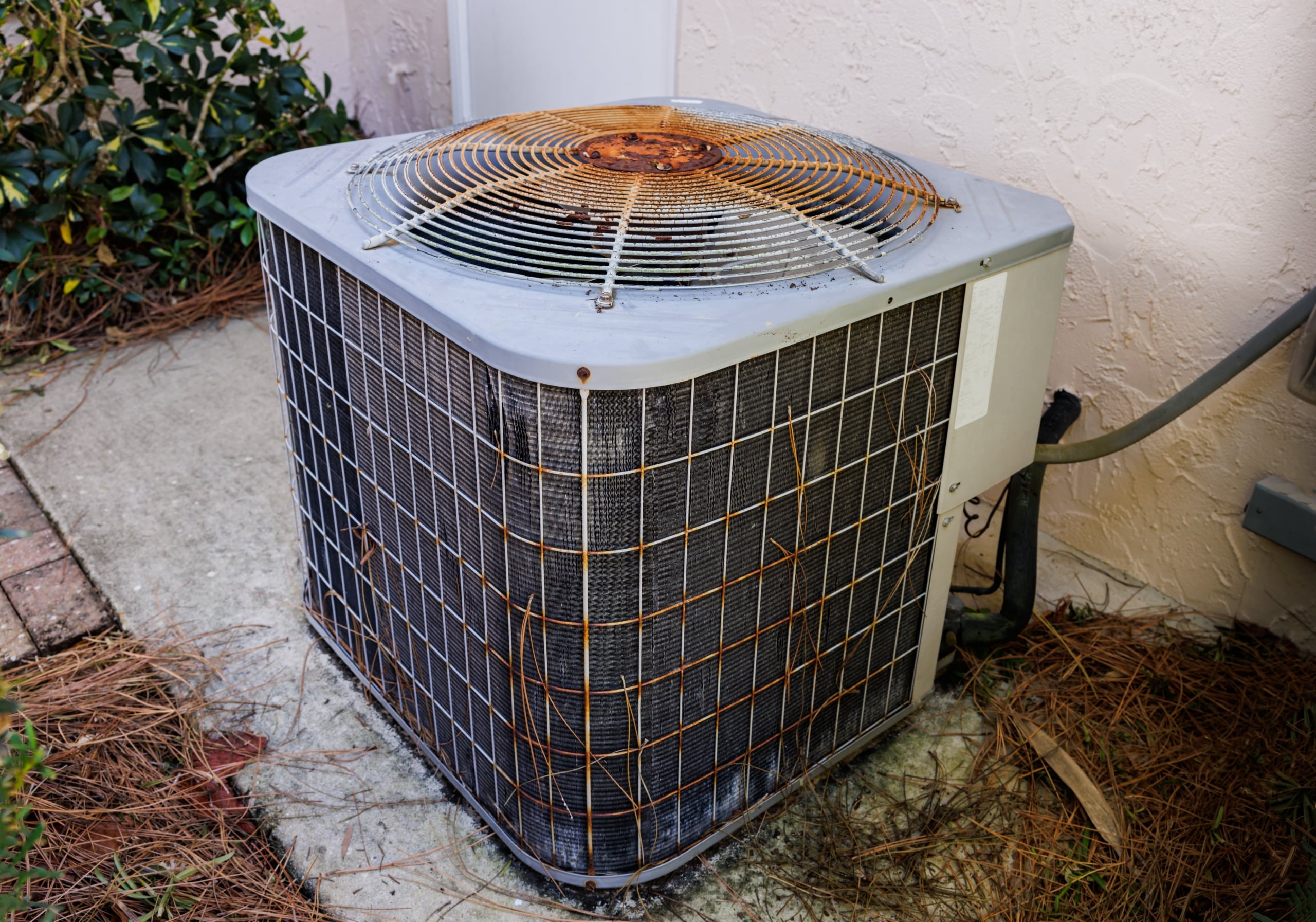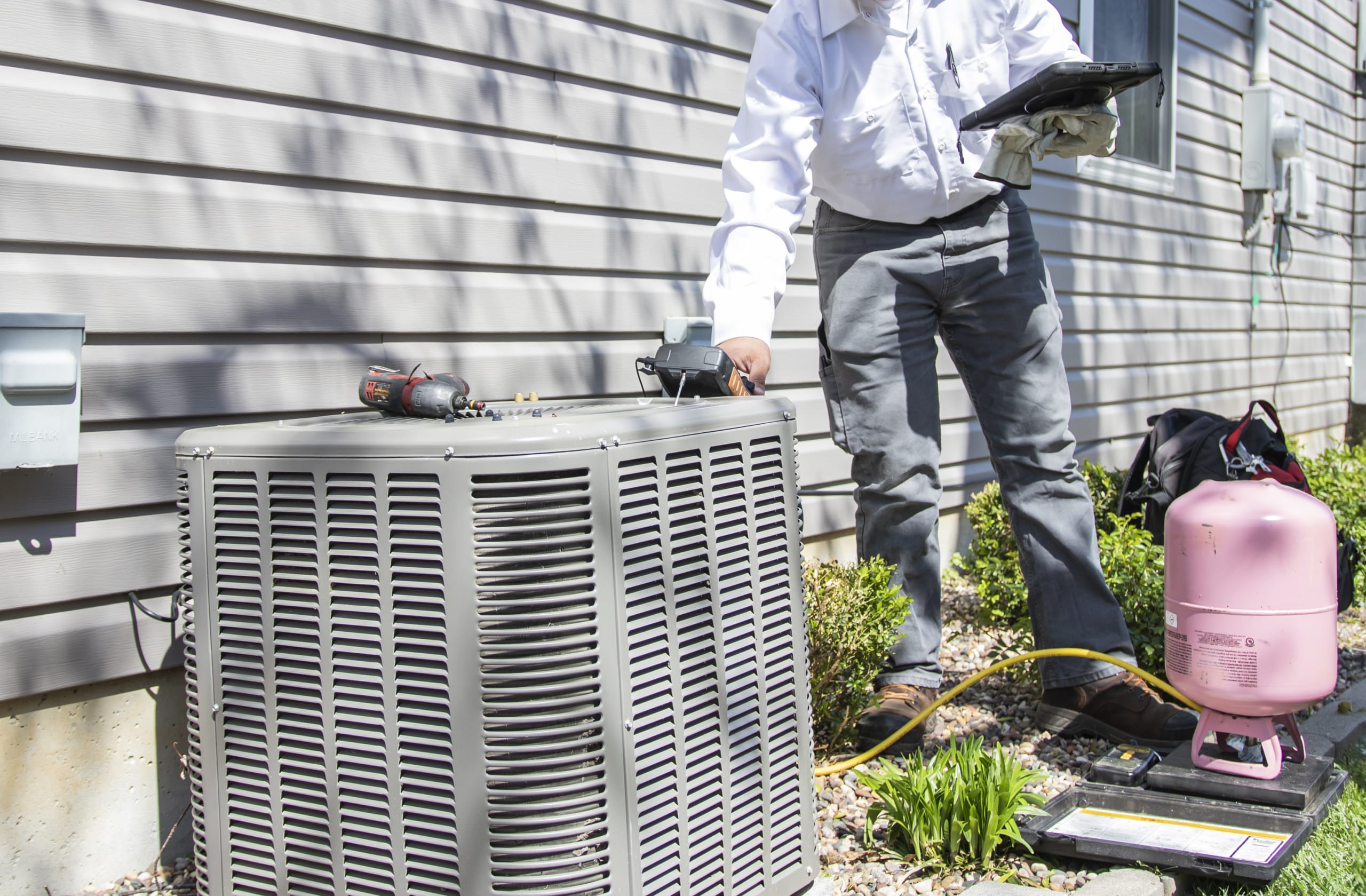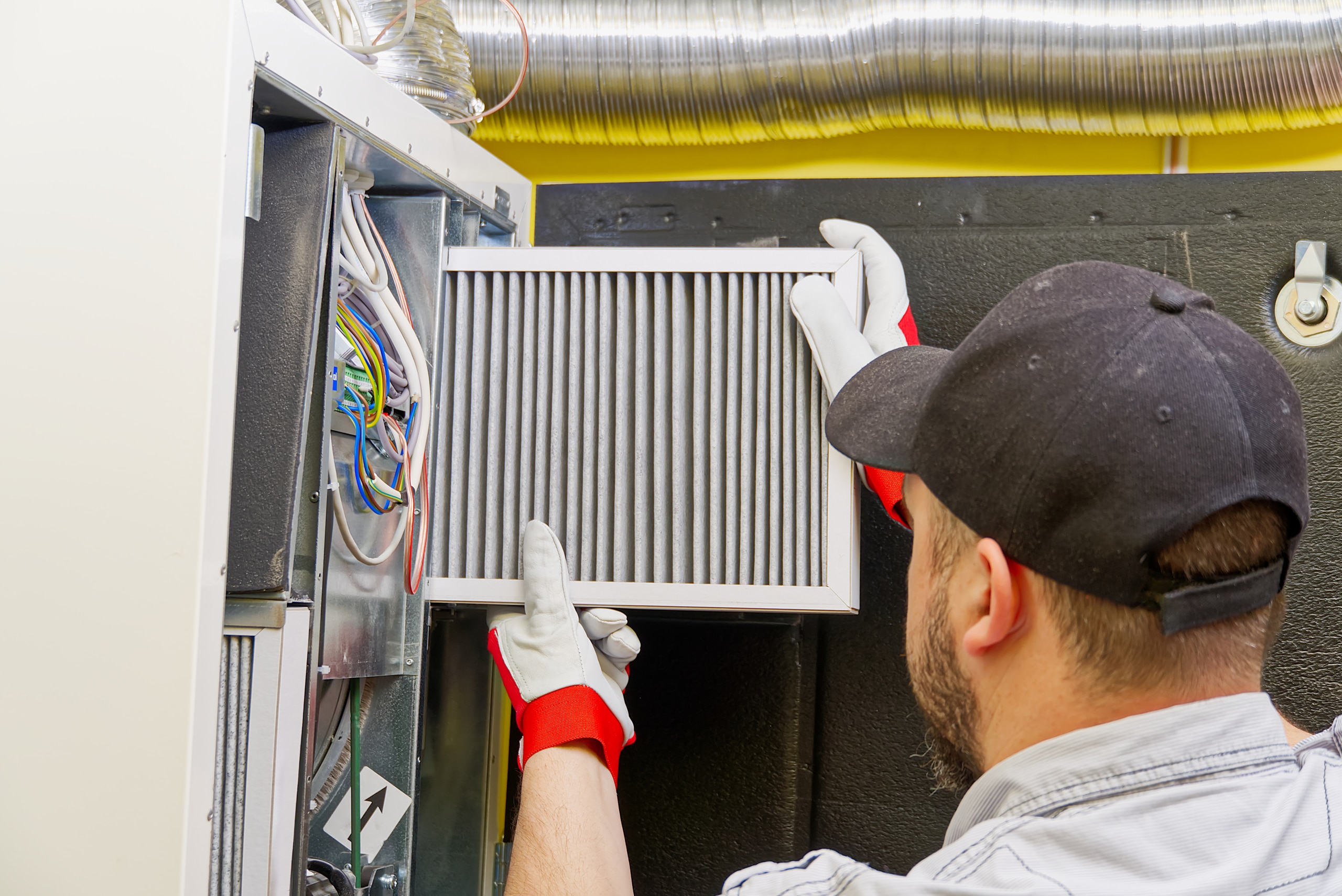Energy bills, water leaks, and high humidity are just a few signs that it’s time to replace your HVAC system. While pulling the trigger on high-ticket service items may be difficult, expert HVAC installation can save you money in the long run. Find out if your HVAC system has passed the point of repair.
Table of Contents
- Benefits of HVAC System Replacement
- Signs It’s Time For HVAC Heating Replacement
- When To Consider HVAC System Replacement
- Tips For Choosing A New HVAC System
- Cost Considerations For HVAC Replacement
- Preparing For HVAC System Installation
- Timely Repairs & Maintenance To Extend HVAC System Lifespan
- FAQ
Benefits of a HVAC System Replacement

When your HVAC system is on the fritz, there comes a point when it’s more beneficial to replace than to repair. Not only can repairs be costly, particularly if you have to keep making them every few months, but they also perpetuate a model that may not be safe to use anymore.[1]
Older systems may not be equipped with built-in safety shutdowns; they can lead to anything from a blown-out fuse to an all-out fire. Replacing your HVAC system is the key to keeping your energy bills down without shivering in the winter or broiling in the summer. The latest models are more than just energy-efficient; they also have more safety mechanisms.
Signs It’s Time for HVAC Heating Replacement
Whether in a residential or commercial property, there may be many signs that it’s time for a new air conditioning and heating installation. Here are some of the most common signs:
Aging HVAC System
It can be difficult to estimate the life of an HVAC system. The number of years depends on how well you care for it, what model you have, and how often you use it. A household system in a temperate climate may last up to forty years, while one in a harsh environment may not go for more than ten years. No matter your system’s environment, it’s essential to get it routinely serviced to prolong its lifespan for as long as possible.
Common HVAC System Problems
Your HVAC system will typically tell you when it’s had enough:
- System Not Blowing Warm Air: If the air is on but blowing at the wrong temperature, it could be a sign that interior parts are malfunctioning. Faulty components on older systems can lead to vibrations that damage not just the HVAC system but the surrounding property as well.
- Broken thermostat: A broken thermostat will not always mean that you need to replace the entire system. However, if the HVAC is continuously short-cycling due to incorrect readings, it can put extreme pressure on the system’s machinery.
- Strange odors: Anything from dirty filters to animal infestation can cause odd scents. In the worst-case scenario, it may be a gas leak. Installing a new HVAC system can be a life-saving measure, especially if the system is decades old.[2]
- Constant operation: A constantly running HVAC system may be due to a broken thermostat or poor insulation. You’ll likely need a new one if the problem is faulty components or an incorrectly sized system (e.g., the HVAC system is too small for the space it heats).
- Dirty air ducts: Dirty air ducts aren’t necessarily due to a dirty filter. If the machine isn’t functioning correctly, it can cause mold and moisture to build up inside your ductwork. If the ductwork isn’t sealed correctly, it can lead to rodent infestation.
- Increasing energy bills: The older the system, the less efficient it will be. So, even if you’re not experiencing any other problems, higher energy bills usually indicate that the system can’t go on much longer.
- Freon or water leaks: Leaks can be caused by any number of issues, including corroded refrigerant lines, defective pumps, or a malfunctioning compressor. Depending on the root cause of the problem, HVAC installation may be the best solution.
- High humidity in your home: If you’ve noticed the air in your home is too humid for your taste, it could be due to anything from an improperly sized system to a broken condenser.
- Rattling or Grinding Noises: Rattling or grinding can mean that a single part has come loose, or the entire system is starting to go. If the motors and fans are all around the same age, it’s not uncommon to see them all begin to malfunction around the same time.
- Weak airflow: Dirty filters and ducts can contribute to weak airflow, but it could also be due to a faulty blower. If you’ve cleared out the clutter and replaced the filters and nothing has changed, it could be due to an outdated or faulty HVAC system.
- Frequent repairs: This is the most common sign that you need a new system. At some point, if you constantly have to call in a technician every few months (or more), you will have to bite the bullet and get a new one.
When to Consider HVAC System Replacement

If you’re experiencing frequent issues with your HVAC system, it’s likely time for a replacement. The problem can’t be solved by simply opening the windows in the summertime or sealing all your doors and windows during the winter. Your heating and cooling can majorly affect your health and comfort. If the air is stifling hot or freezing cold, it won’t take long before it affects your quality of life.
The best thing you can do is pay attention to your HVAC system. If you find you’re adjusting the temperature, seeing unexplained puddles in the corner, or the airflow is compromised on a regular basis, it’s time to call in an expert.
Tips for Choosing a New HVAC System
A new HVAC system is a significant financial investment. Here are some tips for how to choose:
- Size: It’s more common than you might think for people to get a system that is too large or too small for their property. It’s not just square footage; it’s also the number of people using the property and your preferred temperature settings.
- Energy-efficiency: The more energy-efficient the HVAC system is, the less you’ll spend on utility bills. While the short-term costs of a better unit might be hard to swallow, the long-term savings can be substantial.
- Choose an install team you can trust: The reality is that the contractor you choose matters. You want to work with someone who can recommend an HVAC system that will last you as long as needed. Whether you plan to sell the property in the next five years or keep it for as long as you live, a contractor can tell you how to maximize the value of every dollar you spend.
Cost Considerations for HVAC Replacement
As you evaluate your budget for the project, consider the following:
Compare Repair Costs to Cost of a New HVAC System
Repair costs can add up. Look at your old statements and multiply those numbers by the foreseeable future. You’re likely to find that the costs simply aren’t sustainable.
Factors That Can Affect HVAC System Cost
Typically, the longer a system lasts and the more energy-efficient it is, the more expensive it will be. As a general rule, you should choose a reliable brand with a good track record — even if the price tag is higher.
Financing, Tax Credits, Rebates, & Incentives
An HVAC system is a large investment that can easily cost thousands. That’s why Hoffmann Brothers offers our clients reasonable financing terms, so they don’t have to take out a loan. Tax credits may also be via federal, state, or local programs. Finally, many brands offer rebates or incentives for buyers, sweetening the pot for choosing a particular carrier.
Preparing For HVAC System Installation
The best way to prepare to install a new system is to work with the right contractor. At Hoffmann Brothers, our team has the experience to make the installation stage a breeze for our clients.
We may ask you to cover up your belongings to protect them from dust or to turn off the power. We encourage our clients to be involved with the steps of the installation so they can ask questions as the job rolls along.
Timely Repairs & Maintenance to Extend HVAC System Lifespan

Timely repairs and inspections for an HVAC system are the key to getting the best return on investment. For property owners, this usually means changing filters regularly and checking for flammable materials anywhere around the machinery. The Hoffmann Brothers team is here to help with all that and more.
While there are some DIY repairs that a property owner can reasonably make, the reality is that HVAC systems can be dangerous if you make a mistake. Additionally, faulty installation can reduce system efficiency and significantly lower the lifespan of your new system.[3] If you’re looking for a team that can install as well as repair and maintain, Hoffmann Brothers specializes in optimizing the performance of our clients’ appliances.
Frequently Asked Questions
The standard answer is between 10 – 20 years, depending on the model, frequency of use, and property size.
Common signs you need an HVAC install include frequent repairs of your current system, high utility bills, and leaks.
It’s typically a full-day job, lasting around 6 – 7 hours. An experienced team may be able to cut down on your heater installation time.
There are plenty of DIY guides for heater replacement, though you must understand the risks attached. Hiring a professional prevents unnecessary injuries and can save money by completing the job right the first time.
The steps to install an HVAC system depend on the type of system, the unit model, and the property type. A large commercial property will have very different ductwork than a two-bedroom home.
Yes, you should replace your system before it fails. A faulty HVAC system can increase fire risk or release harmful gasses into your home’s air.



